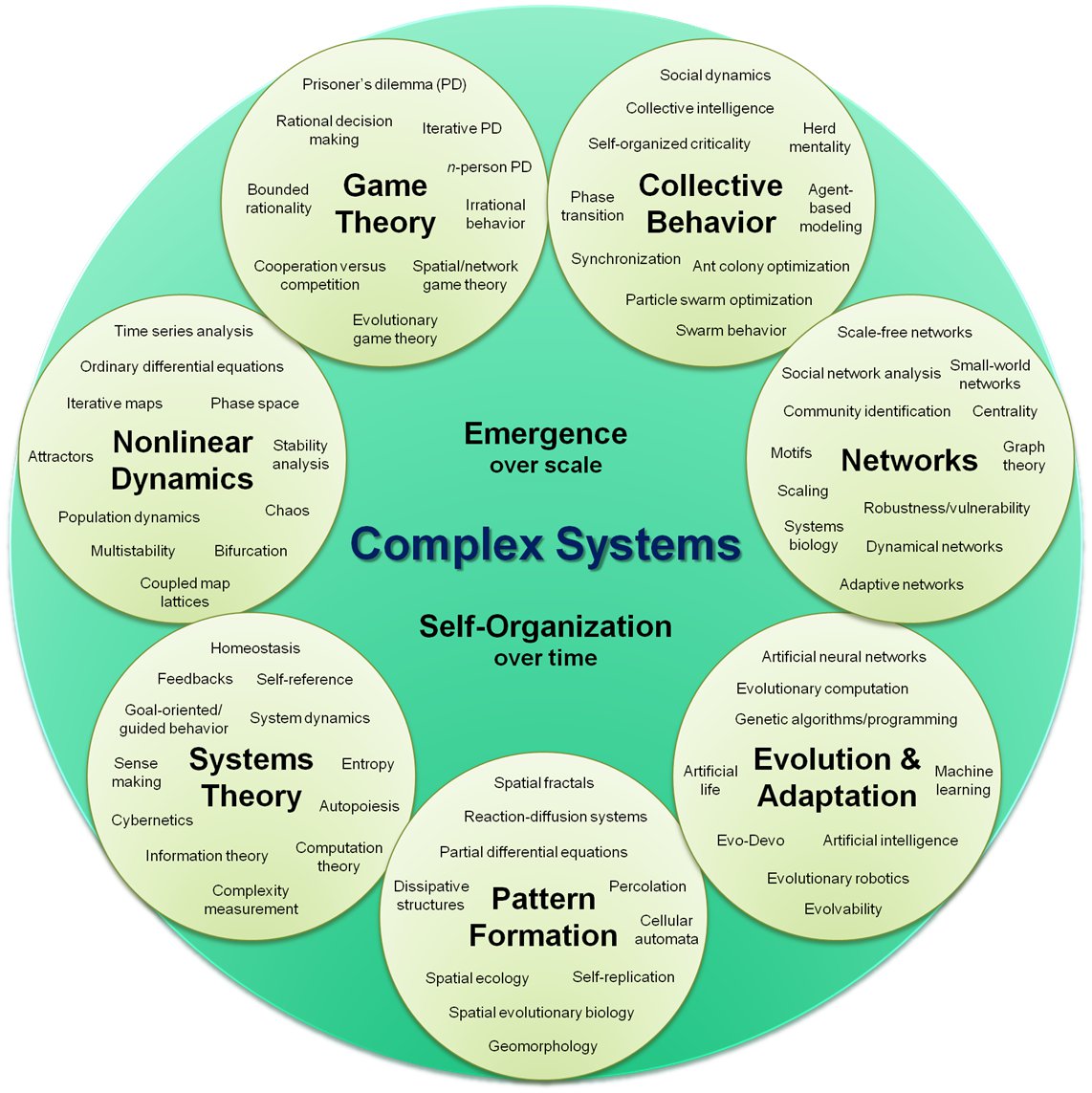complex systems
*a system composed of a large number of independent simple components that locally interact in an independent and nonlinear fashion, exhibit self-organization through inter- actions that are neither completely random nor completely regular and are not influenced by some central or global mechanism, and yield emergent behavior at large scales that is not predictable from observation of the behavior of the components.
– Complex Adaptive Systems, Systems Thinking, and Agent-Based Modeling
Handy image from Wikipedia on the different areas:
 By Hiroki Sayama, D.Sc. - Created by Hiroki Sayama, D.Sc., Collective Dynamics of Complex Systems (CoCo) Research Group at Binghamton University, State University of New York, CC BY-SA 3.0, https://commons.wikimedia.org/w/index.php?curid=12191267
By Hiroki Sayama, D.Sc. - Created by Hiroki Sayama, D.Sc., Collective Dynamics of Complex Systems (CoCo) Research Group at Binghamton University, State University of New York, CC BY-SA 3.0, https://commons.wikimedia.org/w/index.php?curid=12191267
1. Complex systems and complex adaptive systems
Complex adaptive systems are special cases of complex systems that are adaptive in that they have the capacity to change and learn from experience. Examples of complex adaptive systems include the stock market, social insect and ant colonies, the biosphere and the ecosystem, the brain and the immune system, the cell and the developing embryo, the cities, manufacturing businesses and any human social group-based endeavor in a cultural and social system such as political parties or communities.
Complex systems have some indicative characteristics. They have a large number of elements, each of which interacts with and influences other elements within the system through nonlinear feedback loops. They constantly interact with their environment, and, frequently, they contain smaller systems within them while themselves being nested within bigger systems. They are never in equilibrium but are continually in flux, evolving through time as a result of both their previous conditions and the environment around them.
2. Examples
Common examples given are ecosystems, financial markets, the brain, ant colonies, economies, and many other examples where large numbers of constituents independently interact on a local level that yield some unanticipated nonlinear outcome at scale.
– Complex Adaptive Systems, Systems Thinking, and Agent-Based Modeling
Complex systems can often be modelled using differential equations, and control theory is used to gently adjust their behaviour so that the change over time goes as planned
3. Elsewhere
3.1. In my garden
Notes that link to this note (AKA backlinks).
- Animal Agriculture Is the New Crude Oil
- Evolutionary and adaptive systems
- 2024-02-18
- climate system
- complexity science
- Deleuze and Guattari and complex systems
- water cycle
- The Patterning Instinct
- 2021-08-24
- system dynamics
- 2021-08-18
- systems mapping
- 2021-08-25
- The Art and Science of Communism, Part 1 (ft. Nick Chavez, Phil Neel)
- Neither Vertical Nor Horizontal
- The Stigmergic Revolution
- Introduction to Complexity
- flickering
- Complexity and the left
- Commoning is a good way to solve coordination problems
- 2024-12-02
- 2024-02-09
- complex adaptive systems
